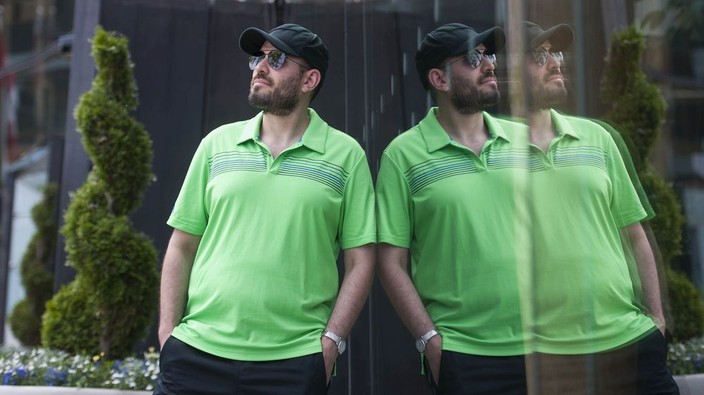surrey man embraces his autism and finds inner peace
for a long time michael bardouniotis denied he had asperger’s syndrome, a high-functioning form of the disorder, before acceptance and pride took root

surrey's michael bardouniotis has gone from denying he has asperger's syndrome to accepting the fact he has high-functioning autism, which has brought peace to his life.
jason payne
/
png
by: gordon mcintyreyour worst enemy can’t hurt you as much as your unguarded thoughts can, the buddha said.michael bardouniotis discovered that last year.he was his own worst enemy, upon reflection, his old self taking him down a self-destructive road, before he found acceptance and headed in a new direction.the 35-year-old has asperger’s syndrome, a form of high-functioning autism. while it causes no significant delay in cognitive or language development, it can interfere with social interactions because of impaired social skills and difficulty expressing emotions.most people with asperger’s have normal or above normal intelligence, and a significant percentage exhibit extraordinary abilities, according to facty health.“these individuals excel at creative pursuits such as painting or music, or have extremely sharp memories or instinctually grasp difficult concepts,” the medical-information website says. “some demonstrate natural talent at games requiring mental acuity, such as puzzles or crosswords.”bardouniotis came to the attention of postmedia when he penned a letter to the editor after reading a guest column in the province by sandi treliving, a director with the centre for addiction and mental health.“living with autism has been no cakewalk,” he said.throughout his 35 years, bardouniotis has never had a core support group of friends he could count on and he often kept to himself growing up. he was judged, misunderstood, ostracized and rejected.still he remained in denial of his learning disability. denial is a such a sweet siren song but, as many do, bardouniotis found out the deeper in denial he was the worse he felt.“when you’re in denial, it’s like you’re your own worst enemy,” he said. “i used to walk around feeling very bitter and angst-ridden. my body language wasn’t good, when i walked down the street i’d feel very, very nervous and stiff, like i couldn’t loosen up.”there was no epiphany, no eureka moment, just a dawning of realization he has autism, it’s a lifelong condition, and it is part of who he is.bardouniotis had found acceptance.“i’d been walking around with this thought in my head that there’s nothing wrong with me,” he said. “last year something just clicked in my mind. it’s hard to explain how it just clicked. i said to myself, ‘know what? i’m tired of being in denial.’“ever since i came to terms with myself i feel more relaxed and a lot more calm about it. i can breathe in every sense of the word.“i’m at peace.”he’d always been guarded about sharing his autism with others because people would pity him when they found out.“i’m sure they mean well, but i don’t really need to hear that.”and because he’s an introvert, he doesn’t speak up much at gatherings, leading others to look at him like he’s from another planet and comment on how quiet he is. yet remaining quiet helps him concentrate and maintain focus.it was difficult, he agreed, to open up to a complete stranger, but his feelings toward ending the stigma of autism were stronger than his reticence.bardouniotis is an early childhood educator and was working for the city of surrey as an auxiliary, working with kids at camps and rec centres, one of the best jobs he’s ever had, he said. but he was laid off because of the covid-19 pandemic.these days he’s on call at sfu childcare.he enjoys reading non-fiction and watching documentaries, and has a youtube channel to showcase his vocal-and-guitar covers.single for awhile now, bardouniotis doesn’t feel he needs someone else to define or complete him.“i think happiness comes around when you stop looking for it so hard.”gordmcintyre@postmedia.comtwitter.com/gordmcintyre
 3 minute read
3 minute read





